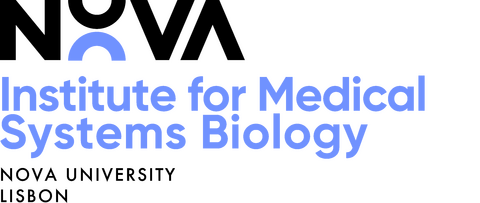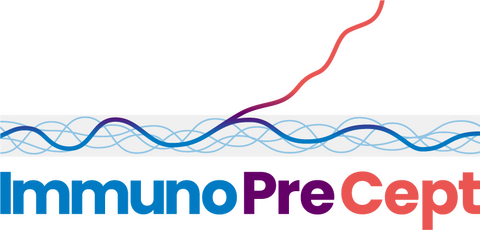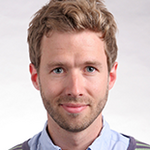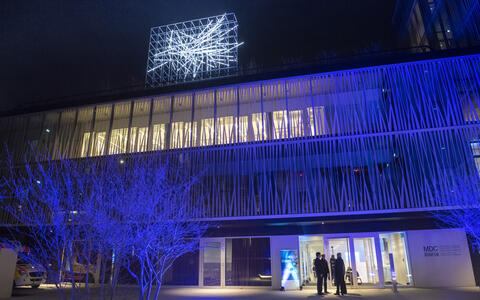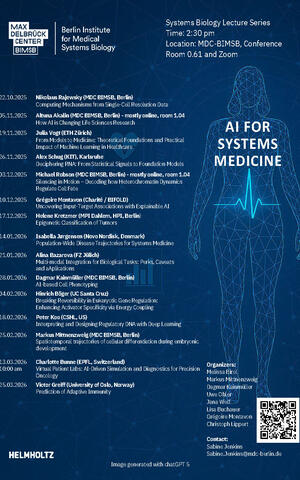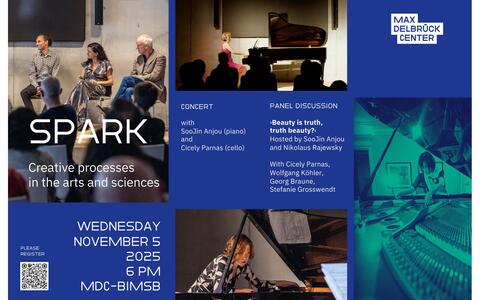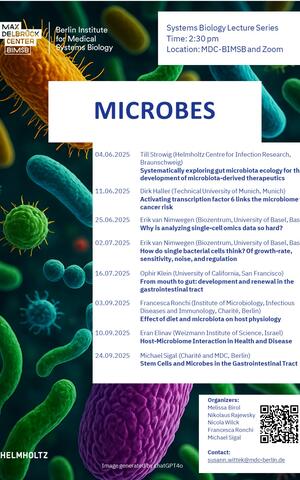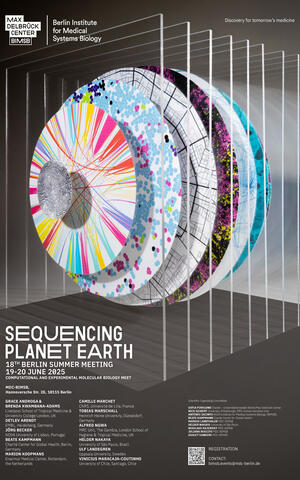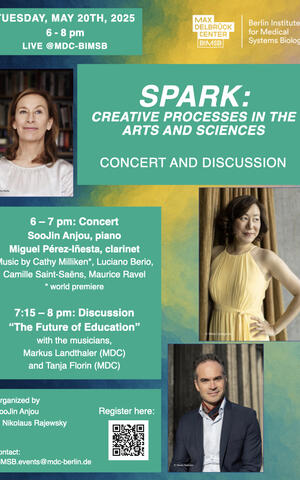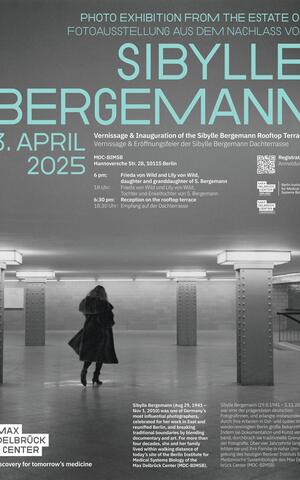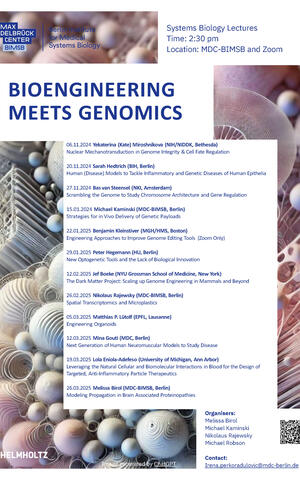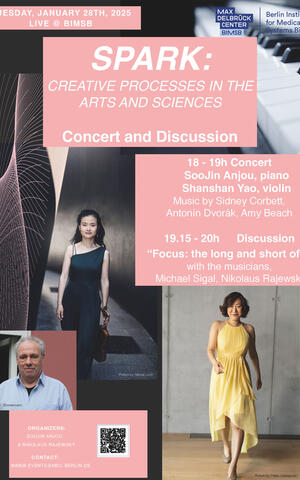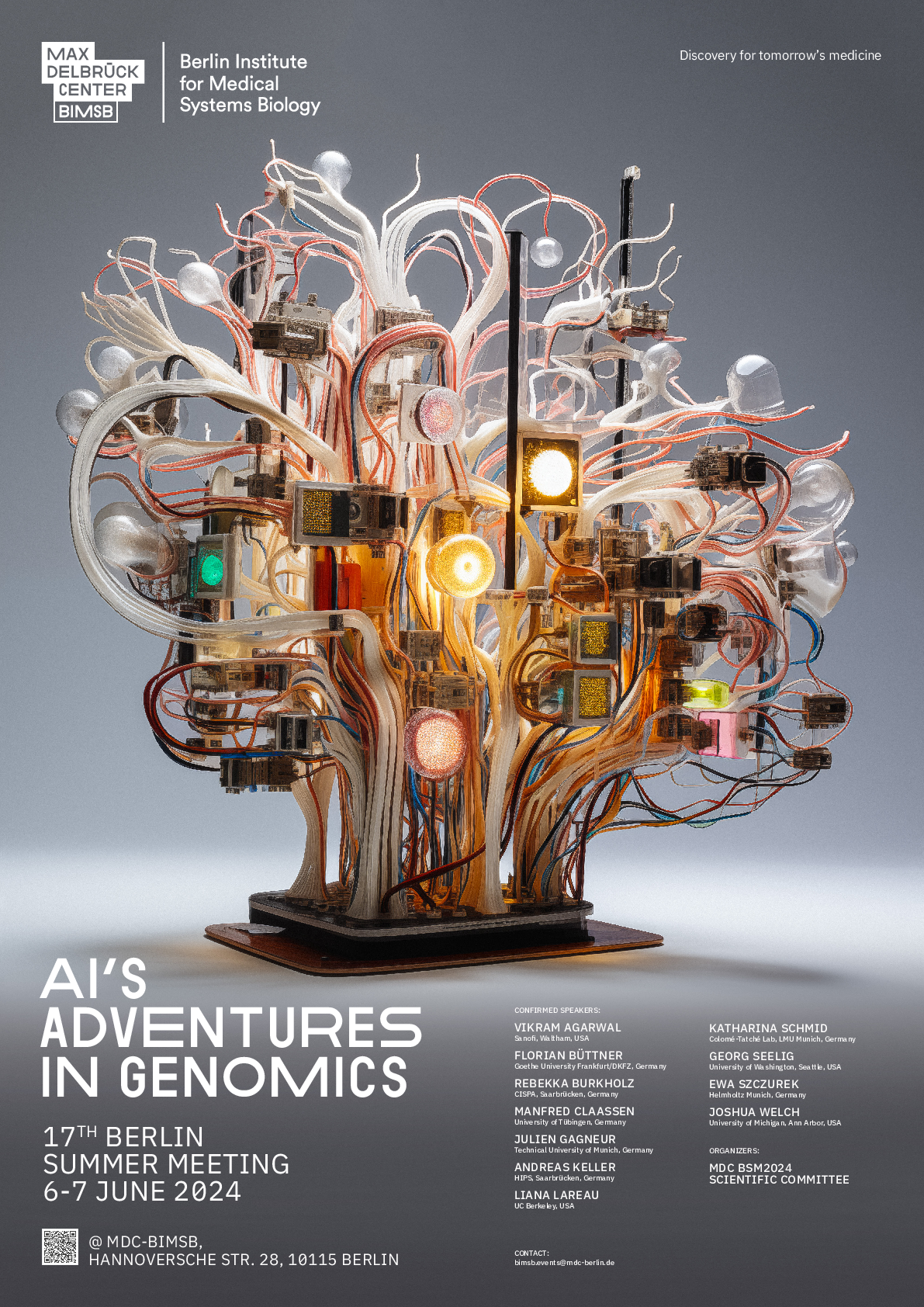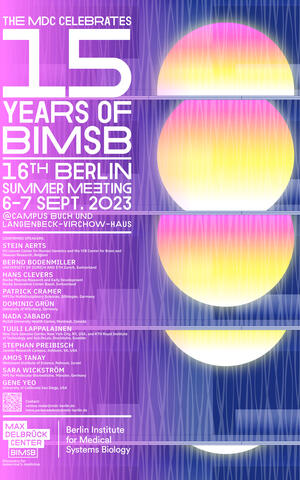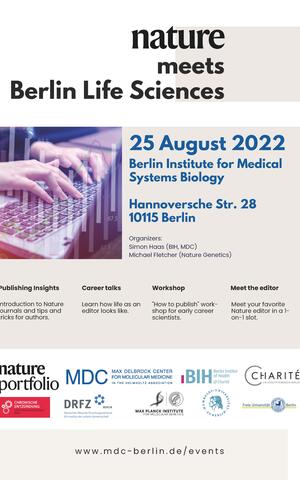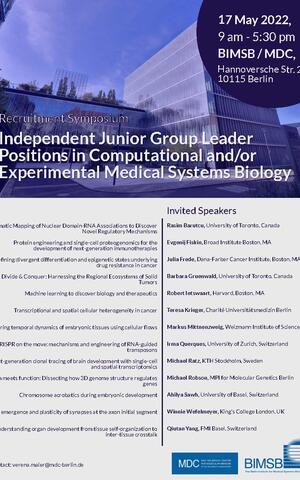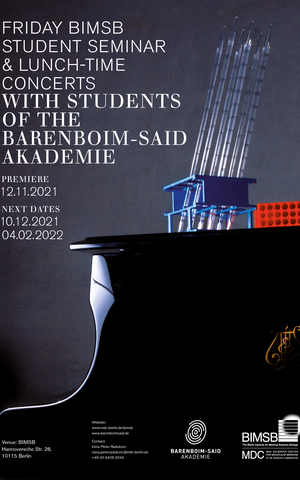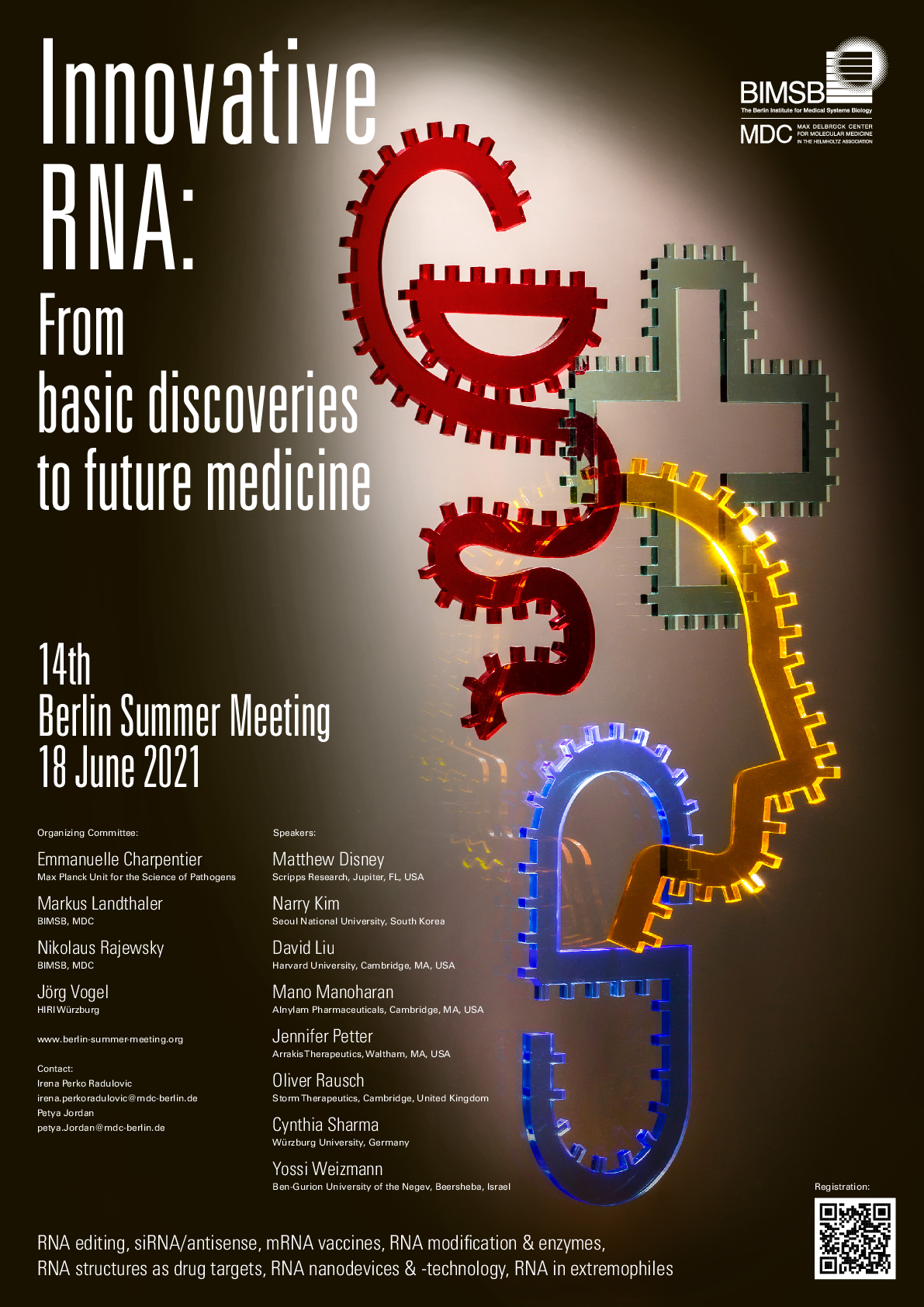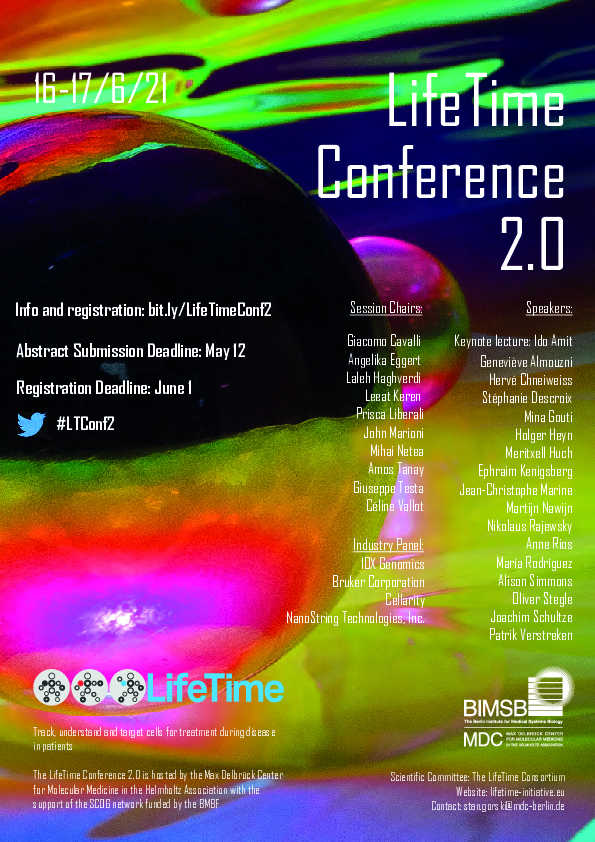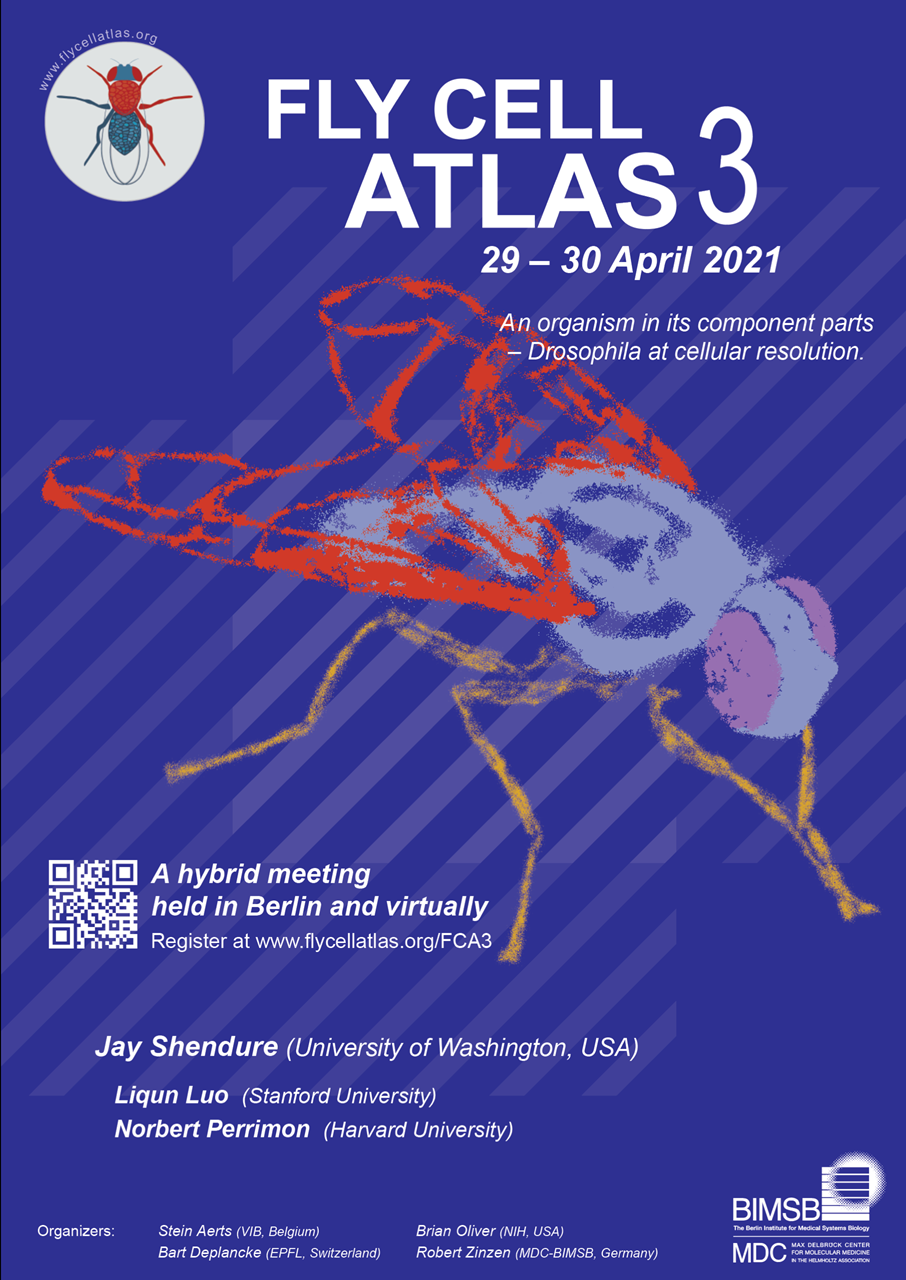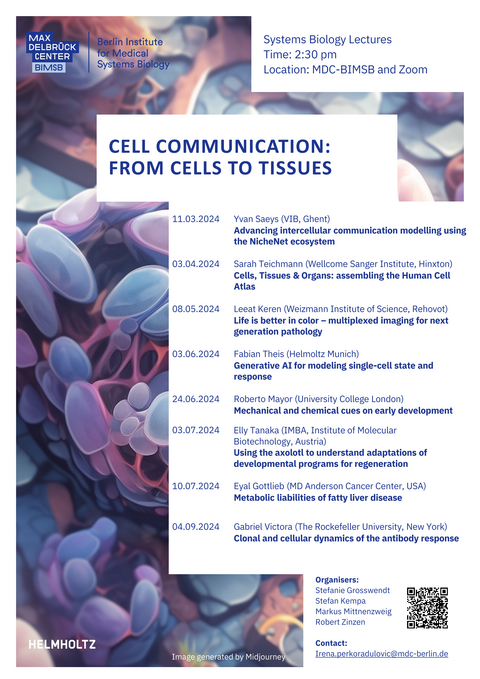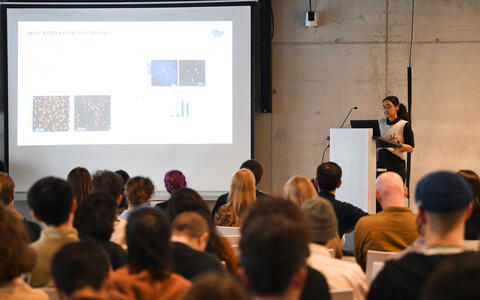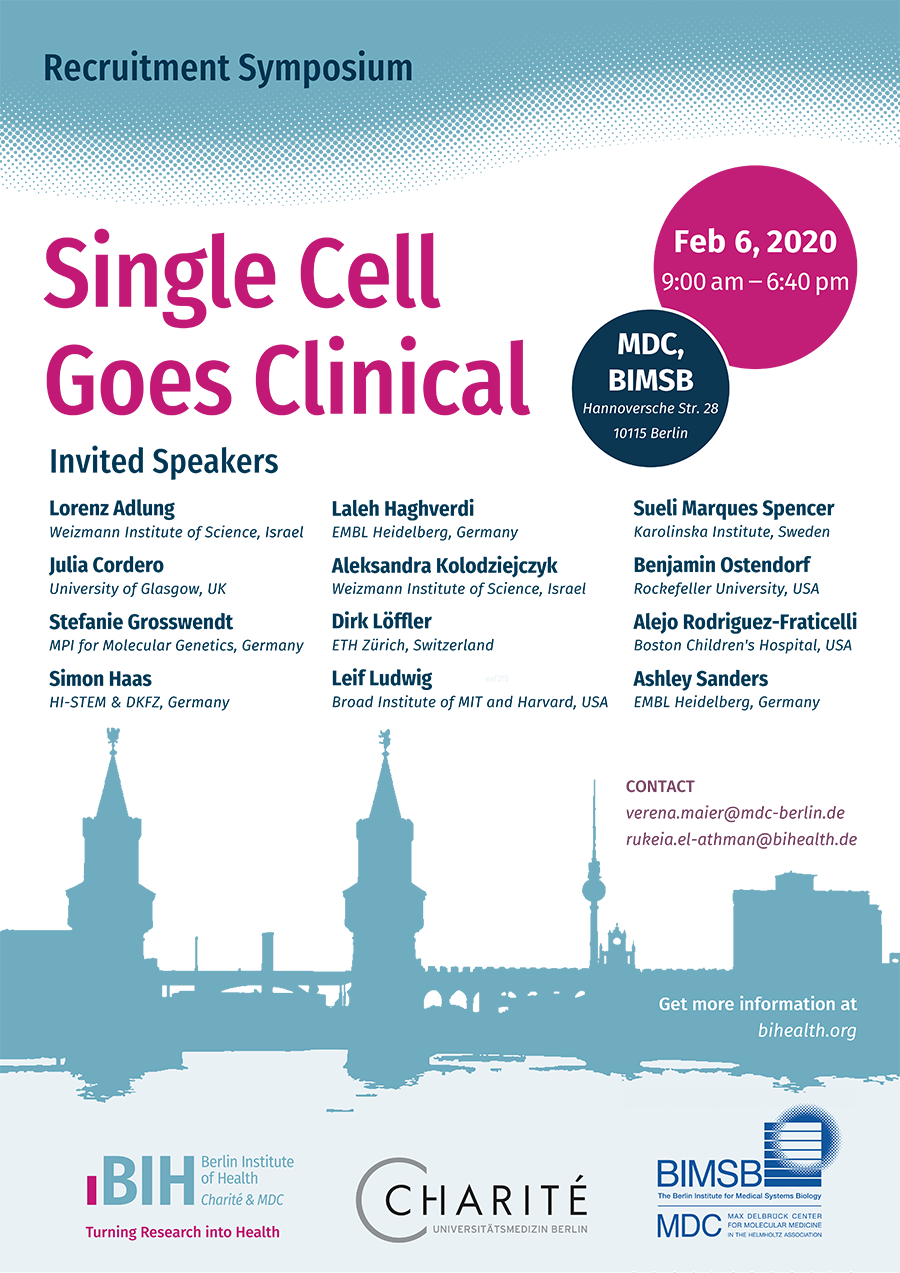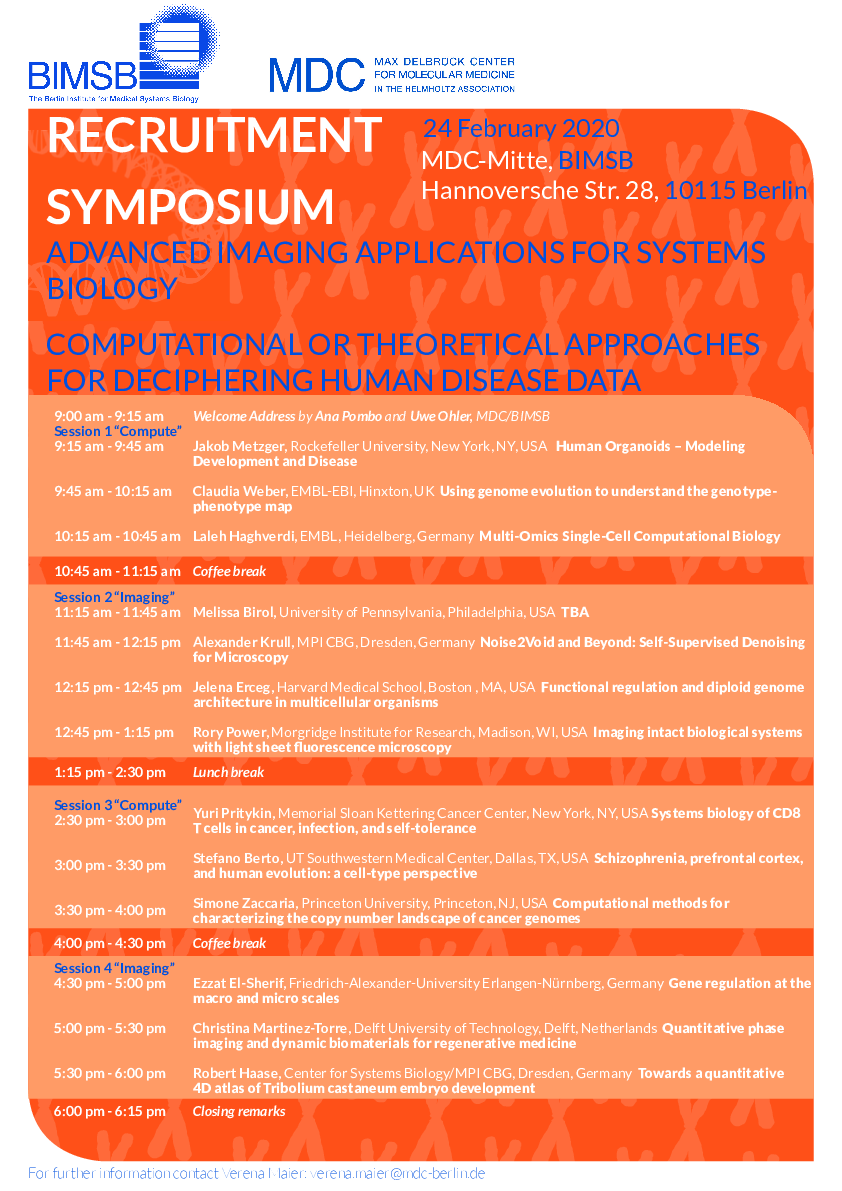
Berlin Institute for Medical Systems Biology (MDC-BIMSB)
About
The Max Delbrück Center - Berlin Institute for Medical Systems Biology (MDC-BIMSB) was initiated and developed by Nikolaus Rajewsky (MDC-BIMSB Scientific Director). MDC-BIMSB is an expansion of the MDC into Medical Systems Biology. MDC-BIMSB received, starting 2008, 19 Mio € kick-off funding through the competitive federal initiative “Spitzenforschung in den neuen Bundesländern” (BMBF & Senate Berlin). After a highly successful external peer-review, the BMBF decided to provide additional institutionalized funding for MDC-BIMSB (17.5 Mio € /year + 2.5 Mio € /year MDC “Eigenanteil”). The Humboldt University included MDC-BIMSB in their successful participation in the “Exzellenzinitiative” and provided the real estate on the new life science Campus in Berlin Mitte. This location is important for the MDC-BIMSB scientific mission and promotes collaborations between the HU and the MDC. The BMBF provided additional money for the new building (33.5 Mio €).
In addition, MDC-BIMSB researchers have thus far newly acquired 83 Mio € in competitive third-party funds.
The NOVA Institute for Medical Systems Biology (NIMSB)
The NOVA Institute for Medical Systems Biology (NIMSB) is a collaborative initiative between the Max Delbrück Center in Germany and NOVA University in Portugal, aiming to advance precision medicine through medical systems biology. The institute focuses on early disease diagnostics and personalized treatment approaches, particularly for high-morbidity diseases like cardiovascular, neurodegenerative, and cancer. NIMSB is modeled after MDC-BIMSB and aligned with the LifeTime Initiative to accelerate the adoption of breakthrough technologies. The partnership benefits from funding under the EU's "Teaming for Excellence" program and additional Portuguese support, positioning NIMSB as a leading center for innovation, education, and collaboration in biomedical research.
ImmunoPreCept: Exploring the Health-Disease Bifurcation for Cell-based Molecular Prevention and Interceptive Medicine
The ImmunoPreCept Cluster of Excellence is a pioneering research initiative dedicated to redefining health as an active, dynamic state maintained by intricate immune and tissue interactions. Focusing on the earliest molecular and cellular shifts that precede disease, ImmunoPreCept aims to enable precision diagnostics, prevention, and early intervention for chronic conditions such as immune-mediated inflammatory diseases and cancer. Led by Professors Britta Siegmund, Andreas Diefenbach, and Nikolaus Rajewsky, the cluster unites leading expertise across immunology, systems biology, data science, and clinical medicine, the cluster builds on Berlin’s strong research ecosystem to establish a world-leading cluster for health-focused innovation. Through interdisciplinary collaboration, advanced technologies, and strong societal engagement, ImmunoPreCept seeks to transform the way we understand, maintain, and protect human health. Instutional partners of the ImmunoPreCept initiative are Charité – Universitätsmedizin Berlin, the Max Delbrück Center for Molecular Medicine (MDC), the German Rheumatism Research Centre (DRFZ), the Max Planck Institute for Molecular Genetics (MPI MolGen), the Berlin Institute of Health (BIH), the Museum für Naturkunde, Freie Universität Berlin (FU), and Humboldt-Universität zu Berlin (HU).
Spark: Creative Processes in the Arts and Sciences
Spark: Creative Processes in the Arts and Sciences is a concert and discussion series, organized by SooJin Anjou & Nikolaus Rajewsky, which aims to foster a creative exchange between music and science. Befitting the motto of MDC-BIMSB, “Breaking Boundaries”, the series invites world-class musicians, composers and scientists to share their insights and experiences in lighting the creative fire in their respective fields.
Each event in the series presents a concert –– often featuring world-premieres of new works –– and an interactive panel discussion featuring musicians and scientists.
Faculty
MDC-BIMSB Groups
MDC-BIMSB Associated Groups
https://www.mdc-berlin.de/news/news/barcelona-berlin
MDC-BIMSB Affiliated Groups
Scientific Technology Platforms
State-of-the-art in-house technology platforms are instrumental to carry out the data intensive research characterizing systems biology. MDC-BIMSB Scientific Technology Platforms provide core services, plan projects in close collaboration with both MDC groups and local/international partners, and also conduct research and method development projects, pushing forward novel scientific and in particular medical applications towards personalized medicine.
The MDC-BIMSB Scientific Technology Platforms currently offer:
Cooperations
Collaborations and International Networks
- Local Partners
Humboldt-Universität zu Berlin (HU)
DFG research center for applied Mathematics (MATHEON)
German Center for Rheumatology Research (DRFZ)
Max Planck Institute for Molecular Genetics (MPI-MG)
Berlin Institute of Health (BIH)
With the Berlin Institute of Health (BIH), the MDC and the Charité - Universitätsmedizin Berlin have joined forces to build a research space for translational research and overarching systems medicine approaches to bridge the gap between basic research and clinical application. MDC-BIMSB is a strong collaboration partner for BIH groups and projects.
HELMHOLTZ EINSTEIN INTERNATIONAL BERLIN RESEARCH SCHOOL IN DATA SCIENCE (HEIBRiDS)
HEIBRiDS is a joint school in Data Science between the Einstein Center Digital Future (ECDF) and the Helmholtz Association. Established in 2018, HEIBRiDS is an interdisciplinary program that trains young scientists in Data Science applications within a broad range of natural science domains, spanning from Earth & Environment, Astronomy, Space & Planetary Research to Geosciences, Materials & Energy and Molecular Medicine. HEIBRiDS brings together six Helmholtz Centers and four university partners from ECDF, with 25 fully-funded PhD projects at the intersection of Data Management, Machine Learning and Deep Learning, Imaging, Mathematical Modelling and High-throughput Data Analytics. MDC is the Helmholtz coordinator and participates in the school with five PhD projects in collaboration with the Humboldt University of Berlin, the Technical University of Berlin and Charité university hospital.
For more information visit: https://www.heibrids.berlin/ or contact: Eirini.Kouskoumvekaki@mdc-berlin.de
- National Networks
Single Cell Omics Germany (SCOG)
Setting up a network for single-cell researchers in Germany and beyond is the goal of Single Cell Omics Germany (SCOG). The initiative is jointly coordinated by Fabian Theis at the Institute of the Computational Biology HMGU in Munich, Nikolaus Rajewsky at the MDC-BIMSB and Jörn Walter at Saarland University and funded by the BMBF/DLR.
Single-cell research is revolutionising biology and medicine, combining omics technologies and microscopic analyses of single cells. Rapid technological advances now allow the profiling of genomes, transcriptomes, epigenomes and proteomes in individual cells at an unprecedented level of resolution. New computational methods are being developed and specifically tailored to harness the full potential of these single-cell omics data.
SCOG aims at bringing together national researchers with the mission to foster exchange of both computational and experimental methods and expertise and to strengthen single-cell research in Germany.
German Epigenome Programm (DEEP)
National Bioinformatics Infrastructure for RNA Biology (de.NBI)
- European Initiatives
The project brings together scientists from over 50 research institutes in 18 countries and is co-coordinated by Nikolaus Rajewsky at the MDC and Geneviève Almouzni at the Institut Curie, Paris.
Following recent advances in single cell analysis, in particular in the fields of high-throughput sequencing and imaging, tracking the molecular make-up of human cells in time and space has become more than a distant dream. European experts in molecular and computational biology as well as clinical research have joined forces in LifeTime, an open initiative continuously growing and gathering support.
circRTrain is a Marie Curie Innovative Training Network (ITN) funded by the European Union within the H2020 Programme. circRTrain seeks to understand the origin, function and application of circular RNAs, new large class of non-coding RNAs, by providing cross-disciplinary training in experimental and computational biology for a new generation of researchers. The circRTrain network consists of interdisciplinary experts from leading European institutes such as Aarhus University (Denmark), CRG (Spain), Justus-Liebig-University Giessen (Germany), MDC (Germany), La Sapienza (Italy), UMC Utrecht (Netherlands), and industrial partners Bioneer (Denmark), Eurice (Germany), Exosomics (Italy), Qiagen (Denmark), and qpa (Germany).
CORBEL - Coordinated Research Infrastructures Building Enduring Life-science Services
MDC-BIMSB is a key partner in the cluster project CORBEL, funded by Horizon 2020 for four years (2015-2019). Within this consortium of thirteen biological and medical research infrastructures (BMS RIs) from the European Strategy Forum on Research Infrastructures (ESFRI), MDC-BIMSB represents the infrastructure for Systems Biology in Europe (ISBE). Together with Euro-BioImaging at the EMBL, MDC-BIMSB co-leads one of the biggest work packages of the project (WP4), focusing on bioscience use cases.
At the end of 2016, CORBEL organized a first Open Call for Research Projects. In this framework, academic and industrial scientists in Europe were offered access to more than 15 service providers from 8 research infrastructures, integrated services grouped into 4 access tracks and an application review based on scientific excellence and technical feasibility. 21 selected applicants have since benefitted from open access to cutting-edge technologies and services including support from the Bioinformatics platform of the MDC-BIMSB. Travel grants are enabling nearly 50 visits with transnational access. Based on this successful first edition, a second Open Call offering even more services has been launched on 26 March 2018.
- Worldwide Initiatives
- Institutional Collaborations
MDC-BIMSB is fostering and maintaining collaborations with national and international research institutes, universities, and other organizations to facilitate joint research projects, staff exchange, access to cutting-edge technologies, and development of joint training activities.
NOVA Institute for Medical Systems Biology (NIMSB)
The NOVA Institute for Medical Systems Biology (NIMSB) is a collaborative initiative between the Max Delbrück Center in Germany and NOVA University in Portugal, aiming to advance precision medicine through medical systems biology. The institute focuses on early disease diagnostics and personalized treatment approaches, particularly for high-morbidity diseases like cardiovascular, neurodegenerative, and cancer. NIMSB is modeled after MDC-BIMSB and aligned with the LifeTime Initiative to accelerate the adoption of breakthrough technologies. The partnership benefits from funding under the EU's "Teaming for Excellence" program and additional Portuguese support, positioning NIMSB as a leading center for innovation, education, and collaboration in biomedical research.
MDC Exchange Program in Medical Systems Biology with New York University and University of Edinburgh
The program was launched (initially as MDC-NYU) in 2009 to train the next generation of systems biologists in experimental as well as computational approaches to understand the complex processes of life. Graduate students are jointly supervised by faculty from MDC and CGSB (Center for Genomics and Systems Biology) of the New York University Biology department or MRC Human Genetics Unit at University of Edinburgh. Short-term and long-term research visits within the program allow the students to take advantage of complimentary scientific and training expertise.
with Technion - Israel Institute of Technology (TEC) and The Hebrew University of Jerusalem (HUJI):
The German-Israeli Research School "Frontiers in Cell Signaling and Gene Regulation" is part of the Helmholtz International Research School Initiative and brings together leading experts from MDC (Berlin, Germany), Technion (Haifa, Israel) and Hebrew University (Jerusalem, Israel). Students in the field of cell signaling, gene regulation, and quantitative biology are jointly supervised by investigators from Germany and Israel and spend up to 6 months in the partner laboratory abroad.
Poznan-Berlin collaborations in RNA biochemistry have a long-standing history tied to the late Prof. Dr. Volker Erdmann (FU Berlin, member of the Polish Academy of Sciences). The Institute of Bioorganic Chemistry (IBCH) of the Polish Academy of Sciences (PAS) has various interactions with MDC-BIMSB. Young researchers from Poznan have joined MDC-BIMSB with great success (e.g. Monika Piwecka et al., Science 2017). Nikolaus Rajewsky has collaborated with Jan Barciszewski (e.g. as editor for the Springer book series RNA Technologies). PIs of both institutions are enthusiastic about the initiative of joint research endeavors and the development of a long-term sustainable partnership.
PhD Exchange
The MDC Exchange Program in Medical Systems Biology was launched in 2009 (as MDC-NYU PhD Exchange Program) to train the next generation of systems biologists. Ten PhD students are able to spend up to two years working and studying at the Center for Genomics and Systems Biology at New York University or at the MRC Human Genetics Unit at University of Edinburgh. Students can also take advantage of our state of the art technology platforms and a training programme of specialist courses and personal development opportunities.
Location
MDC-BIMSB moved to the center of Berlin
Berlin Institute for Medical Systems Biology (MDC-BIMSB)
Hannoversche Str. 28,
10115 Berlin
Telephone: +49 30 9406-1300
In spring 2019, MDC-BIMSB scientists moved from the Max Delbrück Center’s research infrastructure at the Campus in Berlin-Buch to the center of Berlin (Hannoversche Straße 28). The building is entirely new and located on the central historical Campus of the Humboldt University. This new research site represents the first institutional and infrastructural expansion of the Max Delbrück Center into Berlin-Mitte, supporting even closer interactions with major academic and medical institutions in the city and region.
The design for the new MDC-BIMSB building has been selected through an architectural competition and is perfectly integrated into the given setting at the Humboldt Campus Nord. It provides space for up to 25 research groups, approximately half experimental and half computational, offering 5400 sqm of laboratory and office space. The building hosts high-tech-labs, state-of-art technology platforms, flexible workspaces and communication areas that further promote innovative and interdisciplinary research.
After the site had been handed over to the MDC in November 2014, construction started in February 2015. Following clearance of the site, ground testing and construction of the passage to and from Hannoversche Straße, deep ground work and excavation took place in spring 2015.
The pouring of the concrete marked the completion of the second phase of construction. This was celebrated at the official dedication of the building on December 15, 2016, with the architects and representatives of the MDC, partner institutes, and the City of Berlin attending.
The building was inaugurated by German Chancellor Angela Merkel in February 26, 2019.
Directions
The MDC-BIMSB is located in Berlin-Mitte on the grounds of the Life Sciences Campus of Humboldt-Universität zu Berlin (HU). The pedestrian entrance can be reached through a gate between the Federal Ministry for Economic Affairs and Energy and the Institute of Agricultural and Urban Ecological Projects (IASP). There is no parking available on site.
With public transport
- Bus: 142 (Torstraße/Oranienburger Tor)
- Subway: U6 (Oranienburger Tor)
- S-Bahn city train: S1, S2, S25, S26 (Nordbahnhof or Oranienburger Straße); S1, S2, S25, S26, S3, S5, S7, S9 (Friedrichstraße)
- Tram: M1, M5 (Torstraße/Oranienburger Tor); M5, 12 (Hannoversche Str.)
- By train: via Hauptbahnhof or Friedrichstraße
By car
- street parking (limited availability, fee required)
- underground garage nearby: Hannoversche Straße 5b, 10115 Berlin (fee required)
Events
- SPARK 12 | Multimedia Concert | Music by Messiaen | Video by Lillevan | Discussion "Seeking the Mysterious in Art and Science"
26 February 2026, 18:00 - 20:15 Uhr
- Systems Biology Lecture Series 2025/2026: AI for Systems Medicine
-
Systems Biology Lecture Series 2025/2026: AI for Systems Medicine
- Spark 11 | Music by Wolfgang Köhler und Sergei Rachmaninoff | Discussion: "Beauty is truth, truth beauty"?
- 5. November 2025, 18:00 - 20:15 Uhr
-
- SysBio Lecture Series 2025: Microbes
Systems Biology LecturesTime: 2:30 pm Location: MDC-BIMSB and Zoom Organisers: Melissa Birol Nikolaus Rajewsky Nicola Wilck Francesca Ronchi Michael Sigal- 18th Berlin Summer Meeting – Sequencing Planet Earth
- June 19, 2025, 9:00am - June 20, 2025, 5:00pm
More information- Spark 10 | Music by Cathy Milliken, Berio, Saint-Saëns, Ravel | Discussion: “The future of education”
- May 20, 2025, 6:00 - 8:00pm
More information- Photo Exhibition from the Estate of Sibylle Bergemann
More information- SysBio Lecture Series: Bioengineering meets Genomics
-
Systems Biology Lectures Time: 2:30 pm Location: MDC-BIMSB and Zoom Organisers: Melissa Birol Michael Kaminski Nikolaus Rajewsky Michael Robson Contact: Irena.perkoradulovic@mdc-berlin.de - New Date: Spark 9 - Creative processes in the arts and sciences - 28 Jan 2025
- Spark: creative processes in the arts and sciences is a new concert and discussion series which aims to foster a creative exchange between music and science.
-
Befitting the motto of the Berlin Institute for Medical Systems Biology (MDC-BIMSB), “Breaking Boundaries”, the series invites world-class musicians, composers and scientists to share their insights and experiences in lighting the creative fire in their respective fields. Each event in the series presents a concert –– often featuring world-premieres of new works –– and an interactive panel discussion on questions such as: what can scientists and artists learn from each other? How we can tackle current political and societal challenges creatively? - Spark 8 | Music by David Friedman, Händel, Debussy, McCoy Tyner | Discussion: “Improvisation in art, science, life”
More information- Spark 7 | Music by Reggie Moore, Kreisler, Schubert | Discussion: “A CV of failures”
More information- 17th Berlin Summer Meeting – AI’s Adventures in Genomics
- 6-7 June 2024
-
We are excited to announce that registration is now open for the 17th Berlin Summer Meeting – AI’s Adventures in Genomics, taking place 6-7 June 2024 in the Elsa Neumann Communication Room in Mitte! The annual Berlin Summer Meeting: Computational and Experimental Biology Meet brings together scientists at the interface of experimental molecular biology and computational biology and connects young researchers with top-level senior scientists. The 2024 edition of the symposium provides a platform to explore the latest advancements, challenges, and prospects in harnessing AI for biomedical research and applications. Join us to delve into the forefront of this rapidly evolving field, gain insights from leading minds, and expand your professional network. The deadline for abstract submission is 1 May 2024. Attendance of the Berlin Summer Meeting 2024 is free of charge, but registration is required until 1 June 2024, and seats are limited. For further details and registration, please visit: https://www.mdc-berlin.de/BSM2024 - 16th Berlin Summer Meeting: The MDC celebrates 15 years of BIMSB
- Sept 6-7, 2023
-
The Berlin Summer Meeting: Computational and Experimental Biology Meet brings together scientists at the interface of experimental molecular biology and computational biology and connects young researchers with top-level senior scientists. This year’s Berlin Summer Meeting will showcase exciting new developments in the field of systems biology, work by BIMSB alumni as well as science which has been highly impactful for us – and we are excited to be hosting a fantastic selection of international experts! Please find further information here. - New Date: Spark 6 - Creative processes in the arts and sciences - 25 June 2024
- Spark: creative processes in the arts and sciences is a new concert and discussion series which aims to foster a creative exchange between music and science.
-
Befitting the motto of the Berlin Institute for Medical Systems Biology (MDC-BIMSB), “Breaking Boundaries”, the series invites world-class musicians, composers and scientists to share their insights and experiences in lighting the creative fire in their respective fields. Each event in the series presents a concert –– often featuring world-premieres of new works –– and an interactive panel discussion on questions such as: what can scientists and artists learn from each other? How we can tackle current political and societal challenges creatively? With Soojin Anjou (piano) and Martin Smith (cello). - nature meets Berlin Life Sciences - 25 Aug 2022
-
- BIMSB music:science in coorporation with Barenboim-Said Academy - 24 June 2022
- We are very happy to invite you all to join the third instalment of our concert format “music:science”, once more bringing science and music together!
Where: BIMSB Large conference room 0.61, ground floor. When: 24th June 2022 music:science 1:00 – 2:00 pm: Student Seminar Medical Systems Biology 4:00 – 5:00 pm: Concert by Barenboim-Said Academy Students 5:00 – 7:00 pm: Drinks reception/Get-Together on our rooftop terrace- Junior Group Leader Symposium - 17th May 2022
-
- BIMSB music:science Concerts in coorporation with Barenboim-Said Academy - 29th April 2022
Second edition of our concert series after wonderful feedback after last year's premiere! Students of MDC and the Barenboim-Said-Academy will meet over music and science (and coffee, obviously).- BIMSB music:science in coorporation with Barenboim-Said Academy - 12th Nov 2021
- Breaking boundaries is part of our mission – between research and clinics, between science and society.
-
This is why we are introducing a new format, aiming to break boundaries between the worlds of science and music: starting on November 12th 2021, we invite you to join the inaugural installment of lunch-time concerts and enjoy world-class music performed by students of the renowned Barenboim-Said Akademie followed by the latest research presented by BIMSB students in the Student Seminar in Medical Systems Biology. - Berlin Summer Meeting: "Innovative RNA: from Basic Discoveries to Future Medicine"
- 18th June 2021
-
We are excited to announce the 14th Berlin Summer Meeting 'Innovative RNA: from Basic Discoveries to Future Medicine', which this year – since we had to rethink it in light of the pandemic – is going to take place as a virtual event. https://berlin-summer-meeting.org - LifeTime Conference 2.0
- 16th & 17th June 2021
-
We are delighted to announce the LifeTime Conference 2.0 on June 16-17, 2021. This second meeting about cell-based interceptive medicine brings together an exciting selection of international speakers, including selected short talks from abstracts. Moreover, this year’s meeting will be conjoined with the annual Berlin Summer Meeting on June 18th, also organized by the Berlin Institute for Medical Systems Biology (BIMSB) at the Max Delbrück Center (MDC) - Symposium: Fly Cell Atlas 3
- 29 - 30 April 2021: Hybrid event held in Berlin and virtually
-
Drosophila melanogaster has been an incredible model organism for basic research for well over 100 years. Hallmarks include its genetic tractability and the sheer variety and flexibility of the molecular, genetic and genomic tools available to probe organismal biology. For general information about the FlyCellAtlas, please visit the MDC FlyCellAtlas webpage or www.flycellatlas.org. For further information about the program and registration please send an email to webseminar@mdc-berlin.de. Please register via this link - Systems Biology Lectures
- Scientific colleagues come together to present lectures on the topic of Systems Biology. BIMSB welcomes these Lectures as an opportunity to also invite scientists from other research institutions to join.
-
- Student Seminar in Medical Systems Biology at the MDC
- Every second Friday, our students present their work and invite fellow students and scientific faculty to join the discussion.
The seminars take place on Fridays at 12:00 Berlin Time. BIMSB welcomes this Seminar as an opportunity to also invite scientists from other research institutions to join.- BIMSB Guest Speakers
- This event brings together researchers in the field of Medical Systems Biology.
The periodic events are an occasion where invited speakers provide us with updates on recent developments from both Germany and abroad. All members of the campus are welcome to join! Seminars 2023 Jul 6: Talk: Mor Nitzan (The Hebrew University, Jerusalem) 2022 Dec 08: Talk: Petra Hajkova (Medical Research Council London Institute of Medical Sciences) Oct 6: Talk: Yasuhiro Murakawa (Institute for the Advanced Study of Human Biology (ASHBi) and Department of Medical Systems Genomics, Graduate School of Medicine, Kyoto University) May 25: Talk: Stefano Piccolo (University of Padua School of Medicine & IFOM (AIRC Institute of Molecular Oncology) Jan 13: Virtual Talk: Stephan Preibisch (HHMIs Janelia Research Campus, Ashburn, Virginia) 2021 Oct 27: in-person Seminar: Dr Valerie Hilgers (MPI of Immunobiology and Epigenetics, Freiburg) Oct 25: in-person Seminar: Prof Massimiliano Pagani (University of Milan) Oct 5: Virtual Seminar: Dr André Rendeiro (Weill Cornell Medical College) Aug 13: in-person Talk: Prof. Tom Tuschl (Rockefeller University, New York) June 15: Virtual Seminar: Sina Wittmann (MPI-CBG Dresden) Mar 9: Virtual meeting: Elvira Maas (Limes-Institut, Bonn) Mar 17: Virtual meeting: Geraldine Seydoux (Johns Hopkins University School of Medicine, Baltimore) 2019 Nov 14 Michael Sigal (Charité) Sept 2 Joachim Schultze from the University of Bonn | LIMES Institute July 18 Hinrich Boeger from the University of California, Santa Cruz June 11 Remo Rohs from University of Southern California June 4 Erik van Nimwegen, Biozentrum, University of Basel June 3 Alexander Hoffmann from the University of California, Los Angeles June 5 Manuel Irimia from the the Centre for Genomic Regulation (CRG Barcelona) March 12 Abderrahman Khila, Institute Genomics Functional De Lyon March 7 Michael Kaminski, Institute for Medical Engineering and Science, Massachusetts Institute of Technology August 28 Tineke Lenstra, the Netherlands Cancer Institute August 31 Peter Kharchenko, the Department of Biomedical Informatics of the Harvard Medical School April 1 Jeremy E. Wilusz, Department of Biochemistry & Biophysics, University of Pennsylvania Perelman School of Medicine- Distinguished Speakers
- Each year, around four world-leading scientists are invited to give special Distinguished Speaker lectures.
26 November, 2019 Gunter Meister (Full professor and Chair of Biochemistry, University of Regensburg) 28 October, 2019 Itai Yanai (Director, Institute for Computational Medicine; Professor, Biochemistry and Molecular Pharmacology; New York University, School of Medicine)- Breaking Boundaries - Virchow 2.0
- Berlin has a long tradition as a medical metropolis and also the potential to become an international hub for the life sciences, comparable to Boston. On September 28, researchers from both cities discussed this issue with the Governing Mayor of Berlin, Michael Müller.Watch the event:
Deutsch: https://youtu.be/BPA_m23XQ8U English: https://youtu.be/KbEw76BKDP8- 1st "Condensates & Phase Transitions" Workshop, (online event)
- 27 November 2020
Register HERE.- Recruitment Symposiums “Single Cell goes Clinical" and "Advanced Imaging Applications for Systems Biology" &"Computational/Theoretical Approaches for Deciphering Human Disease Data"
- Feb 6, 2020, 9 am – 6:40 pm and Feb 24, 2020, 9 am – 6:15 pm

